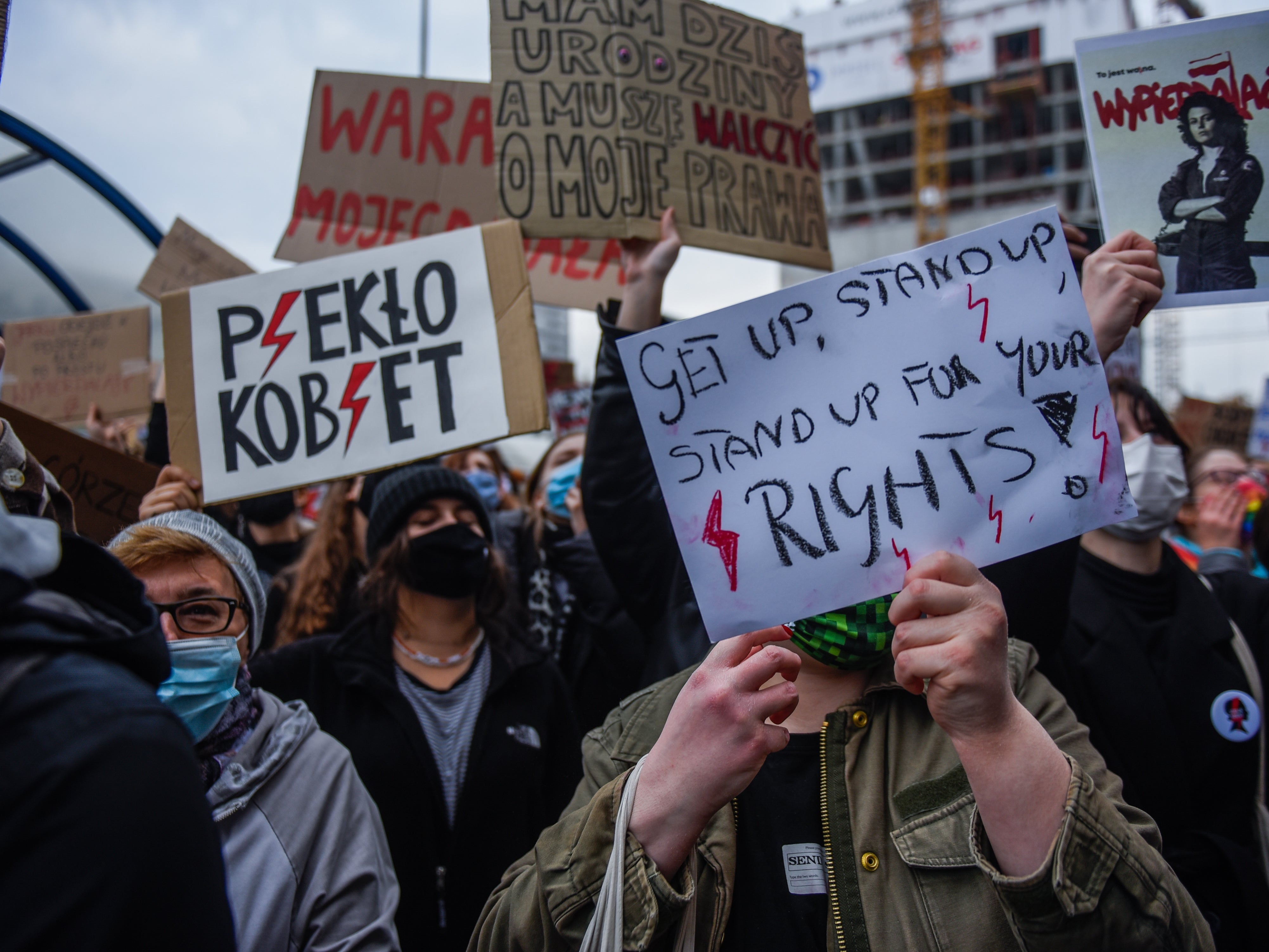Poland abortion law: Nationwide strike launched after controversial ruling
People dodge work to protest after terminations banned even in cases where child will die at birth

Your support helps us to tell the story
From reproductive rights to climate change to Big Tech, The Independent is on the ground when the story is developing. Whether it's investigating the financials of Elon Musk's pro-Trump PAC or producing our latest documentary, 'The A Word', which shines a light on the American women fighting for reproductive rights, we know how important it is to parse out the facts from the messaging.
At such a critical moment in US history, we need reporters on the ground. Your donation allows us to keep sending journalists to speak to both sides of the story.
The Independent is trusted by Americans across the entire political spectrum. And unlike many other quality news outlets, we choose not to lock Americans out of our reporting and analysis with paywalls. We believe quality journalism should be available to everyone, paid for by those who can afford it.
Your support makes all the difference.Workers have downed tools across Poland as part of a national strike against a top court's near-total ban on abortion.
People vowed to stay off work on Wednesday following a nationwide call to arms after terminations were outlawed in the country even in cases of congenitally damaged foetuses.
The Women's Strike, the key organisers of protests over the past week, called the national strike under the slogan: "We are not going to work".
Polish media report that some university classes have been called off, while the mayors of Warsaw and Krakow are also supporting the call for workers to stay off their jobs.
Tensions have been on a knife-edge in the central European nation of 38 million ever since the Constitutional Tribunal ruling last Thursday sparked daily mass protests.
Rage over the ruling, which would deny legal abortions to women even in cases where a child is certain to die upon birth, has been directed at the Roman Catholic Church and Jaroslaw Kaczynski, the ruling party leader and most powerful politician in the country.
Women entered churches on Sunday where they disrupted masses, confronted priests with obscenities and spray-painted church buildings — while a day later protesters brandished placards which said: “I wish I could abort my government” and “I want choice, not terror”.
Hillary Margolis, a women's rights researcher for Human Rights Watch, told The Independent the mass demonstrations continuing despite the risks of the coronavirus pandemic showed how much the ruling “will impact the lives of everyday women and girls” and that the Polish people “will not stand for their human rights being violated and their lives and health being put at risk”.
Yet Poland's deeply conservative government has vowed not to back down.
Mr Kaczynski accused protesters of seeking "to destroy Poland" late on Tuesday and called on his party's supporters to defend churches "at any cost".
He spoke to a camera backed by Polish flags in an announcement that some critics compared to a notorious announcement of martial law in 1981 by communist leader Wojciech Jaruzelski to crack down on anti-regime protests.
Some saw his words as an incitement to violence, since the 71-year-old holds the job of deputy prime minister in charge of police and security services.
On Sunday, members of some far-right groups and football fans surrounded churches to defend them, in some cases provoking skirmishes with protesters and police.
Szymon Holownia, the founder of a new centrist political movement, claimed Mr Kaczynski, "in the name of defending the Church, wants to set fire to the country and drown it in blood".
Bartosz Weglarczyk, the editor of the news portal Onet, argued that the politician was in effect giving permission to football hooligans and far-right extremists "to beat people in the streets".
Mr Kaczynski, however, insisted it was the protesters who were risking lives by gathering in huge numbers amid a pandemic.
Interior minister Mariusz Kaminski on Wednesday vowed "decisive action" by the police "in the face of further attempts of similar acts of aggression and desecration announced by the leaders and organisers of the protests".
He said 76 people have been detained in connection to protests at churches, and prosecutors are carrying out proceedings in 101 cases.
People have been taking to the streets in massive numbers even as the coronavirus spreads fast, with a record 18,820 new cases and 236 new deaths over the past day.
Additional reporting by AP




Join our commenting forum
Join thought-provoking conversations, follow other Independent readers and see their replies
Comments